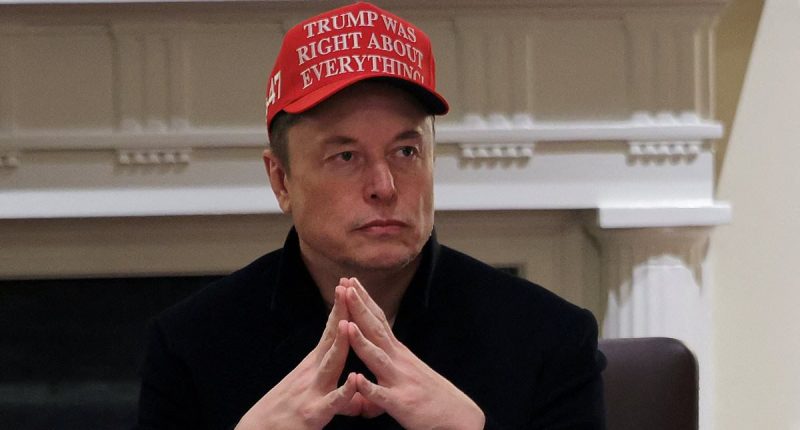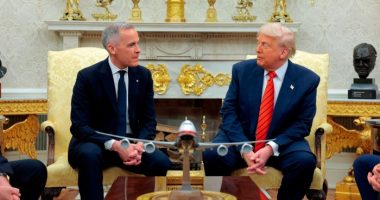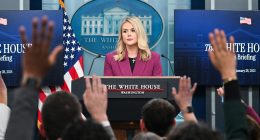Share this @internewscast.com
Investors in the Magnificent Seven tech giants have suffered a torrid start to 2025 after two years of phenomenal growth.
President Donald Trump’s trade war has hammered the mega-cap stocks, as tariff measures have driven costs higher and weighed on global economic prospects.
Spurred on by an artificial intelligence boom and falling interest rates, the so-called Magnificent Seven – Alphabet, Amazon, Apple, Meta, Microsoft, Nvidia and Tesla – climbed by a collective 156 per cent during 2023 and 2024, against a 57.9 per cent rise for the S&P 500 Index.
But this year, the seven stocks have all underperformed the S&P 500, which is down 6.8 per cent since January, according to financial research provider Morningstar.
By comparison, returns among the Magnificent Seven have ranged from a 6 per cent loss for Microsoft to a 16 per cent decline for Alphabet and a 30.1 per cent fall for Tesla.
Will 2025 continue to be a challenging time for the Magnificent Seven, or can they unexpectedly defy the wider economic gloom and reclaim their former strength?
Tariffs take a bite out of Apple and Amazon
Since returning to office on 20 January, Trump has upended the global trade order by introducing sweeping tariffs on US imports.
Trump’s initial announcement involved different tariff levels for a long list of countries, both big and small.
This rocked stock and bond markets, eventually leading to Trump announcing a 90-day tariff pause from 9 April.
A 10 per cent baseline tax still applies to almost all foreign goods; a 25 per cent tariff is on steel and aluminium products, while Chinese-made imports are subject to a whopping 145 per cent tariff.
Although some technology goods, such as computers and smartphones, are currently tariff-exempt, Trump’s trade policy has caused tremendous uncertainty among American tech giants.
Apple and Amazon source a high quantity of their products from China, leaving them very vulnerable if the president decides to axe any exemptions.
Approximately 70 per cent of Amazon’s goods come from China, as do 80 per cent of iPhones sold annually in the US.

Radical change: Since returning to office on 20 January, Trump has upended the global trade order by introducing sweeping tariffs on US imports
Tariffs could force both companies to hike prices, thereby risking a hit to demand, or absorb these extra costs in the form of lower margins.
Apple also potentially faces losing favour in China, where it derived about one-sixth of its sales in the last fiscal year, if the country’s government undertakes devastating retaliatory measures against US firms.
The business has just lost its crown as China’s biggest smartphone seller to VIVO and Huawei, meaning any retaliation could precipitate faster drops.
Apple shares have experienced a cumulative return of -9.3 per cent during Trump’s second term and -15 per cent in total this year.
Tesla shares drove off a cliff
Another firm struggling with greater competition from Chinese models is Tesla, which was overtaken by BYD as the world’s largest electric vehicle seller last year.
Chinese carmakers have rapidly grown over the last decade, supported by generous public subsidies like buyer rebates and sales tax reliefs, as well as vertical integration strategies.
BYD produces its own batteries, software, and electric motors, has stakes in Brazilian lithium mines, and operates car transport vessels.
Controlling most elements of its supply chain allows the group to make vehicles more quickly and cheaply than Tesla.

Controversial: Elon Musk’s tight relationship with Trump and role in cost-cutting Doge has made him a disliked figure for many
However, the slide is not solely down to Chinese cars but also the divisive nature of Tesla’s outspoken chief executive, Elon Musk.
Musk’s tight relationship with Trump, leadership of the Department of Government Efficiency, aka DOGE, and vocal support for the far-right Alternative for Germany party have made him a global hate figure for many.
Boycotts of Tesla motors have erupted, with sales of its EVs plunging by 37 per cent across the European Union in the first quarter of 2025.
Tesla sold 336,681 vehicles during the period, about 50,000 down on the prior three months and way below the 390,000 anticipated by analysts.
Perhaps unsurprisingly, investors with $10,000 in Tesla at the start of 2025 would have around $6,987 by the end of April.
DeepSeek a new frontier for AI
On the same day Trump returned to office, a Chinese artificial intelligence start-up, DeepSeek, launched a new chatbot called R1.
Within a week, it surpassed OpenAI’s ChatGPT to make Deepseek the most downloaded free app on Apple’s app store in the US.
Dubious claims that the AI model was trained for under $6million (£4.8million) with less advanced microchips sparked panic among American tech investors, who sold off Microsoft and Nvidia shares in large volumes.
Given that both businesses have committed billions to developing AI hardware, partly to compete with China, this called their dominance into question.

Top of the charts: DeepSeek overtook OpenAI’s ChatGPT to become the most downloaded free app on Apple’s app store in the US
Jason Hollands, managing director at Evelyn Partners, says DeepSeek ‘challenged the assumption that US big tech with deep pockets had an almost insurmountable lead in developing AI and brought into question some of the extremely rich valuations that the Magnificent Seven had reached’.
‘As investors reassessed exuberance towards the Magnificent Seven, the dam was finally broken.’
Nvidia shares between Trump’s inauguration and 24 April have slumped by 20.9 per cent, while Alphabet, the parent company of Gemini creator Google, has fallen by 18.9 per cent.
Meta and Microsoft escape the wrath
Meta and Microsoft have both outperformed Magnificent Seven peers, with a loss of just 6 per cent each this year.
Their reliance on software has made them less vulnerable to tariffs relative to more hardware-focused groups like Apple, Tesla, and Nvidia.
In Meta’s case, its shares also entered the year priced quite cheaply, ‘leaving less room for a big drop,’ says Lale Akoner, global market analyst at eToro.
‘At the same time,’ he adds, ‘Mark Zuckerberg slashed costs, lifting profit margins, while fresh ad formats such as Reels and new AI-powered targeting tools put a spring back in the company’s core advertising business.’
The effort has paid off; Meta comfortably exceeded Wall Street forecasts in the first quarter of 2025, with sales of $42.3billion and $6.43 in earnings per share.
Microsoft reported a similarly impressive performance; turnover was 13 per cent up at $70.1billion, and net income was 18 per cent higher at $25.8billion in the three months ending March.
The Seattle-based group enjoyed higher demand for cloud computing services and soaring search and advertising revenue, excluding traffic acquisition costs.
Will the Magnificent Seven stocks recover?
Investors have been eager for signs that the White House might back off on some trade war measures, but Trump’s mercurial governing style is providing little guidance.
‘Markets have been zig-zagging up and down on the basis of social media posts,’ says Evelyn Partners’ Hollands.
‘Businesses need to have some line of sight on what the future looks like to make plans, and this is virtually impossible at the moment when it is unclear what trade agreements will ultimately be reached between America and the rest of the world.’
Reflecting on the most recent tech earnings season, Matt Ward, portfolio manager of technology at AXA IM, said: ‘Whilst investors like certainty, we think the pace of adaptation to these complex supply chains is impressive and gives a degree of confidence on the ability to navigate the rolling changes of course we see.’
DIY INVESTING PLATFORMS
AJ Bell

AJ Bell
Easy investing and ready-made portfolios
Hargreaves Lansdown

Hargreaves Lansdown
Free fund dealing and investment ideas
interactive investor

interactive investor
Flat-fee investing from £4.99 per month
InvestEngine

InvestEngine
Account and trading fee-free ETF investing
Trading 212
Trading 212
Free share dealing and no account fee
Affiliate links: If you take out a product This is Money may earn a commission. These deals are chosen by our editorial team, as we think they are worth highlighting. This does not affect our editorial independence.
Compare the best investing account for you














